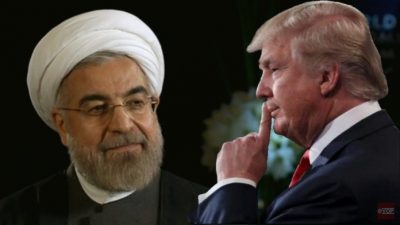Trump’s Iran Deal

Bad deals. Very bad – unless, of course, they are minted in the United States, with Make America Great Again credentials. Hardly the stuff of presidential clout and oratorical flair, but the US president is making good his word to rain on the Iran nuclear deal, otherwise known as the Joint Comprehensive Plan of Action (JCPOA) with an overbearing enthusiasm.
In doing so, the JCPOA joins a growing cupboard of potentially obsolete and endangered agreements of varying benefit and quality, be it the Paris climate accord, the Trans-Pacific Partnership Agreement, or the North American Free Trade Agreement. Nationalists, populists, and activists of all creeds are floundering to find meaning in such gestures.
The Friday speech was filled with customary Trumpist goodies, including the ultimate point that certification of Iranian compliance and general all round good behaviour would not be forthcoming. Instead, President Donald Trump gave a speech shot through with rhetorical punches, ignoring such positions as that taken by Yukiya Amano, director general of the International Atomic agency. Iran, claimed Amano, actually had one of the world’s “most robust nuclear verification regime.”[1]
Central to the Trump barrage were various claims. Among them was the padding of the al-Qaeda link, suggesting that Iran had its share of blame for the September 11, 2001 attacks, irrespective of what ideological underpinnings and differences might have existed.
“The regime remains the world’s leading state sponsor of terrorism and provides assistance to al-Qaeda, the Taliban, Hezbollah, Hamas and other terrorist networks.”
All of these show neat compression, with political interests and differences avoided before the all driving monolithic force of Teheran, the designated supreme bogeyman in regional Middle Eastern politics.
The Trump speech was also insistent that softening the moves on Iran had been a mistake. The regime, he insisted, was starving of oxygen when President Barack Obama went soft. (It was not, but that hardly ruffles feathers in Trumpland.)
“The previous administration lifted these sanctions, just before what would have been the total collapse of the Iranian regime, through the deeply controversial 2015 nuclear deal with Iran.”
Figures receive their fictive gloss; amounts are given a curious dressing. The deal, argues Trump, saw a “massive cash settlement of $1.7 billion from the United States, a large portion of which was physically loaded onto an airplane and flown into Iran.” Other monies also supposedly fell into Iranian coffers: the “immediate financial boost and over $100 billion its government could use to fund terrorism.”
Considering that much of this involved simply thawing and ultimately releasing Iranian assets frozen by the US to begin with, the point is a moot one. The fact-checking wizards have also made the point that the $1.7 billion cash claim involved a decades old claim between Washington and Teheran that was ultimately settled.[2]
The tables are being turned from the Iranian capital. Foreign Minister Mohammad Javad Zarif argued that the speech itself violated the agreement, in spirit if not the letter. If there was a breaker of rules and engagements, it was the US, lauding over what had been agonising negotiations.
“I have,” claimed Zarif, “already written nine letters (to EU foreign policy chief Federica Mogherini) listing the cases where the United States has failed to act on or delayed in its commitments under the JCPOA.”
Iranian President Hassan Rouhani retorted that Trump’s views were formed on “baseless accusations and swear words.” New sanctions directed at Teheran’s missile programme were also deemed unconscionable. “Our achievements in the field of ballistics,” claimed a disapproving Zarif, “are in no way negotiable.”
Other powers are left in a bind. With decertification happening from Washington, what are allies and other negotiating partners to do? The UK’s foreign secretary, Boris Johnson, was bound to be unpredictable, but insisted that his country needed “to keep that deal going – it’s been a great success for UK diplomacy.” Whatever Trump’s ramblings, the deal lived “to fight another day, and that’s a good thing.”[3]
In the final analysis, it may well turn out that Trump is simply firing the first blows against an arrangement that ultimately conceals legitimate Iranian ambitions to acquire a nuclear option. In the current climate, where North Korea is rubbing US noses in the dirt of desperation with each ballistic missile test and defiant nuclear run, officials might be biding their time.
Trump, interestingly enough, seems to want it, to push the incentive rather than drive any disincentive.
“We will not continue down a path whose predictable conclusion is more violence, more terror and the very real threat of Iran’s nuclear breakout.”
No surprise, then, on Trump’s reference in the speech about an alleged, if unsubstantiated claim of collusion between the DPRK and Iran.
“There are also many people who believe that Iran is dealing with North Korea.”
Belief, for some, is truly all that matters.
Dr. Binoy Kampmark was a Commonwealth Scholar at Selwyn College, Cambridge. He lectures at RMIT University, Melbourne. Email: [email protected]
Notes

